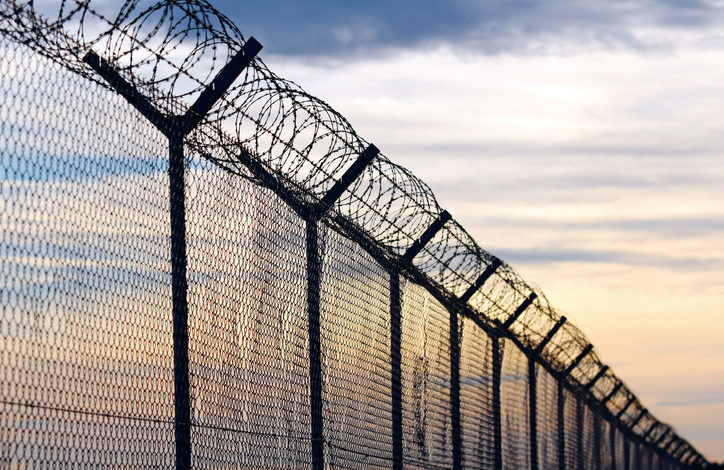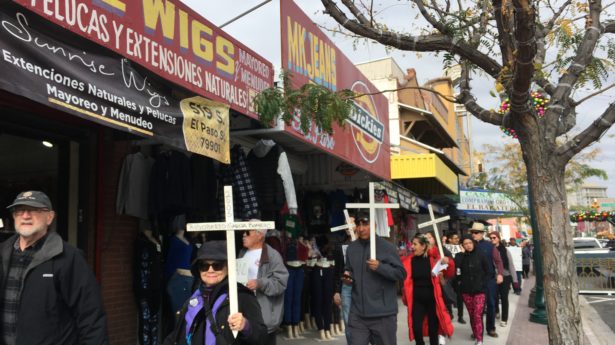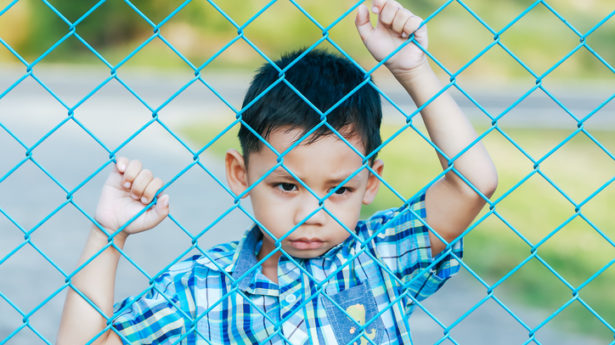The Unitarian Universalist Service Committee advances human rights through grassroots collaborations.
The Shutting Down of Tornillo is a Major Victory, But a Small First Step

By on January 17, 2019
Back in November, when I stood outside the foreboding gates of the Tornillo detention tent camp for immigrant children and watched trucks haul in supplies to build more tents, it was hard to believe that a small group of dedicated activists could really have an impact on a facility so secretive, protected, and remote.
However, on Friday, January 11, two months later, the last bus of children exited those gates for the last time. Tornillo was finally closing. Seven months, $144 million, and nearly 7,000 children held since it was first erected as an “emergency facility,” this piece of the nightmare was ending.
Just as important as the closure, the majority of the kids who were detained at Tornillo have been released to family members—not just transferred to other shelters. Reuniting unaccompanied minors with family in the United States has always been the supposed goal of the shelters, but policy changes under the Trump administration expanded the vetting process and resulted in many more months of detention for children with families ready and eager to receive them. The Department of Homeland Security became involved and used the children as bait to catch undocumented family members after they stepped forward to sponsor a child. With more children entering shelters and few being released, the number of immigrants under 18 held by the U.S. government was at a high of nearly 15,000 in December 2018 – a five-fold increase over the number when Trump took office.
The construction of Tornillo in the summer of 2018 directly resulted from family separation policies. When smaller facilities meeting careful legal standards for childcare were needed for what the government called “tender age children” —babies and kids under 5—Tornillo was hastily constructed to get unaccompanied minors ages 13 and up out of the way and out of sight. While the Office of Health and Human Services announced multiple dates for the closure of this “temporary, emergency facility,” those deadlines invariably would come and go, and the tent city not only remained open, it grew.
The Shut Tornillo Down coalition was formed in November by a dedicated group of faith leaders, including many rabbis and UU ministers, after a national delegation came to Texas to protest and to support Joshua Rubin, who had set up a 24-hour camp at the gates and called it “Witness: Tornillo.” In less than two months, this powerhouse group of volunteers, under the leadership of El Paso local organizers with the Hope Border Institute, had drawn widespread media attention to Tornillo, brought out Members of Congress, and mobilized hundreds of organizations and faith leaders to speak out and call on Baptist Child and Family Services (BCFS), the non-profit social services agency running the day-to-day operation of Tornillo, to end their contract.
Unitarian Universalists Zeb Green, Yadenee Hailu, Rev. Dottie Matthews, and Marie Luna were extremely dedicated to the fight to shut down Tornillo and each spent time in protest outside of the Texas facility. Marie Luna, the Director of Congregational Life at the Fox Valley UU Church in Appleton, WI, described what brought her there:
“I was called to witness and protest the Tornillo children’s internment camp for many reasons, but especially because I know that I would do anything I had to in order to keep my son safe, including walking thousands of miles over as many borders as I needed to. I went to Texas with the full support of my Unitarian Universalist congregation and greater community, who sent thousands of dollars of donations and [I] stood vigil for 24 hours from Christmas Eve to Christmas Day. Mexico may feel far away from Wisconsin, where I am from, but being there showed me just how important it is for all of us—anyone who uplifts and shares our Unitarian Universalist values and principles—to work to end child detention and work for immigration justice.”
The end of Tornillo is not the end of the struggle. In fact, we’ve learned that at the same time Tornillo is shutting down, the one other emergency temporary shelter for immigrant children, located in Homestead, Florida outside of Miami, is nearly doubling its capacity by adding 1,000 new beds.
As we celebrate the closure of Tornillo, we invite you to join us for the next goals of the campaign:
- Get a public commitment from the migrant youth shelter providers that they will not accept contracts to run large uncertified facilities crammed with kids;
- Make sure that the migrant youth shelters have a child-centered process that prioritizes prompt and safe release to family members or sponsors and never crosses the line into prolonged detention;
- End all sharing of sponsors’ fingerprints between the Department of Health and Human Services and ICE, and completely separate the placement of children from immigration enforcement.
We no longer have the excuse for inaction by saying it just can’t be done. “Shut Tornillo Down” shut Tornillo down.
Photo Credit: iStock – kodda

